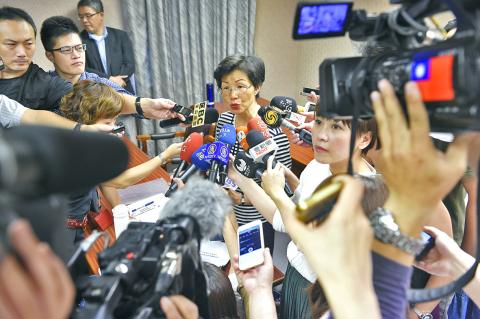Amid renewed debates over the so-called “1992 consensus,” Mainland Affairs Council (MAC) Minister Katharine Chang (張小月) yesterday reiterated that President Tsai Ing-wen (蔡英文) administration respects the historical fact of the 1992 cross-strait talks.
Chang made the remarks on the sidelines of a meeting of the legislature’s Internal Administration Committee, which was reviewing proposed amendments to Article 17 of the Act Governing Relations Between the People of the Taiwan Area and the Mainland Area (臺灣地區與大陸地區人民關係條例).
“President Tsai has stated on multiple occasions our opinions on the ‘1992’ [consensus], which is that we respect the historical fact of the 1992 [talks], with the key being seeking common ground, while reserving differences,” Chang said.

Photo: Chen Chih-chu, Taipei Times
Chang said that over the past two decades, both sides of the Taiwan Strait have made several achievements though communication and interaction.
Both sides should cherish and value these achievements, she said, adding that the government hopes to continue to improve cross-strait ties based on that political foundation.
The “1992 consensus” — a term former council chairman Su Chi (蘇起) admitted to making up in 2000 — refers to a tacit understanding between the Chinese Nationalist Party (KMT) and the Chinese Communist Party that both sides acknowledge there is “one China,” with each side having its own interpretation of what “China” means.
Debates about the existence of the “1992 consensus” have been renewed after American Institute in Taiwan Chairman Raymond Burghardt said in an interview with Voice of America in Washington on Wednesday last week that the term “1992 consensus” did not exist until Su used it in 2000.
China’s Taiwan Affairs Office spokesperson An Fengshan (安峰山) on Saturday said that cross-strait communications were suspended on May 20 due to Taiwan’s failure to recognize the “1992 consensus,” which An said is an embodiment of the “one China” principle serving as the political foundation for cross-strait relations.
Asked by reporters about Burghardt’s remarks, Chang said the government’s stance is that it respects the historical fact of the 1992 talks and the achievements accumulated over the past two decades based on the shared understanding of seeking common ground, while reserving differences.
“The council will continue communications with Beijing and keep up efforts to accumulate goodwill across the Taiwan Strait,” she said.
She added that the amount of Chinese investment in Taiwan between January and last month showed an upward trend.

CHANGING LANDSCAPE: Many of the part-time programs for educators were no longer needed, as many teachers obtain a graduate degree before joining the workforce, experts said Taiwanese universities this year canceled 86 programs, Ministry of Education data showed, with educators attributing the closures to the nation’s low birthrate as well as shifting trends. Fifty-three of the shuttered programs were part-time postgraduate degree programs, about 62 percent of the total, the most in the past five years, the data showed. National Taiwan Normal University (NTNU) discontinued the most part-time master’s programs, at 16: chemistry, life science, earth science, physics, fine arts, music, special education, health promotion and health education, educational psychology and counseling, education, design, Chinese as a second language, library and information sciences, mechatronics engineering, history, physical education

DEADLOCK: As the commission is unable to forum a quorum to review license renewal applications, the channel operators are not at fault and can air past their license date The National Communications Commission (NCC) yesterday said that the Public Television Service (PTS) and 36 other television and radio broadcasters could continue airing, despite the commission’s inability to meet a quorum to review their license renewal applications. The licenses of PTS and the other channels are set to expire between this month and June. The National Communications Commission Organization Act (國家通訊傳播委員會組織法) stipulates that the commission must meet the mandated quorum of four to hold a valid meeting. The seven-member commission currently has only three commissioners. “We have informed the channel operators of the progress we have made in reviewing their license renewal applications, and

The High Prosecutors’ Office yesterday withdrew an appeal against the acquittal of a former bank manager 22 years after his death, marking Taiwan’s first instance of prosecutors rendering posthumous justice to a wrongfully convicted defendant. Chu Ching-en (諸慶恩) — formerly a manager at the Taipei branch of BNP Paribas — was in 1999 accused by Weng Mao-chung (翁茂鍾), then-president of Chia Her Industrial Co, of forging a request for a fixed deposit of US$10 million by I-Hwa Industrial Co, a subsidiary of Chia Her, which was used as collateral. Chu was ruled not guilty in the first trial, but was found guilty

Taiwan People’s Party (TPP) Chairman Huang Kuo-chang (黃國昌) yesterday appealed to the authorities to release former Taipei mayor Ko Wen-je (柯文哲) from pretrial detention amid conflicting reports about his health. The TPP at a news conference on Thursday said that Ko should be released to a hospital for treatment, adding that he has blood in his urine and had spells of pain and nausea followed by vomiting over the past three months. Hsieh Yen-yau (謝炎堯), a retired professor of internal medicine and Ko’s former teacher, said that Ko’s symptoms aligned with gallstones, kidney inflammation and potentially dangerous heart conditions. Ko, charged with